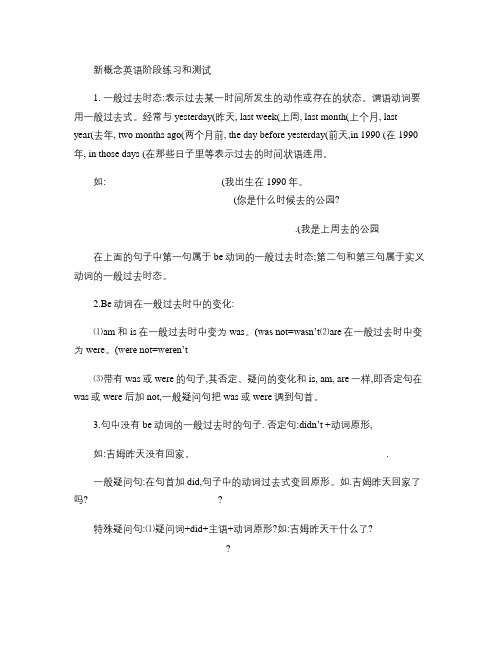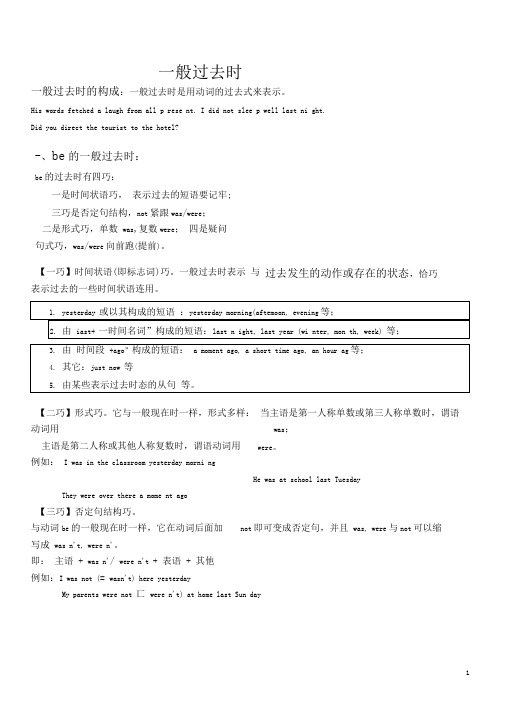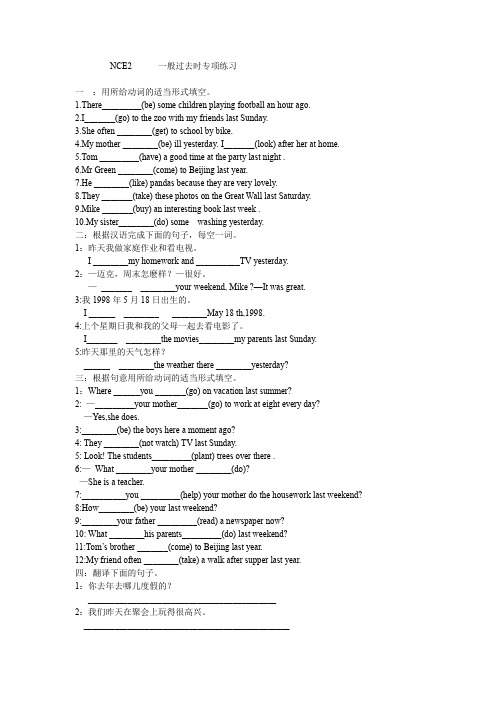乐锄精英教育 新概念 一般过去时习题
(完整版)新概念英语时态讲解及练习题(五种时态)

五种时态讲解及练习题英语的时态(tense)是一种动词形式,不同的时态用以表示不同的时间与方式。
下面就英语中常见的八种基本时态进行阐述,其它的时态都是在这八种时态的基础上结合而成的。
一、一般现在时:1.概念:经常、反复发生的动作或行为及现在的某种状况。
2.时间状语:always, usually, often, sometimes, every week (day, year, month...), once a we ek, on Sundays,3.基本结构:动词原形(如主语为第三人称单数,动词上要加(e)S)4.否定形式:am/is/are+not;此时态的谓语动词若为行为动词,则在其前加don't,如主语为第三人称单数,则用doesn't,通常还原行为动词。
5.一般疑问句:把be动词放于句首;用助动词do提问,如主语为第三人称单数,则用doe s,同时,还原行为动词。
6.例句:It seldom snows here.He is always ready to help others.Action speaks louder than words.1.I like ____________ (swim).2.He _________(read) English every day.3.We _________(go)to school at seven in the morning.4.Mike________(go)to school at seven in the morning.5.My mother________(like) ______(go) shopping.6.I can ________(draw) many beautiful pictures.7.She_________(make) a model plane.8.Do you ________(like)_________(run)?9.Does he_________(like)_________(jump) ?10.Does Nancy_________(grow)flowers on Saturday ?11.The teachers________(like)___________(dance).12.The teacher________(like)____________(dance).2)用所给的人称改写句子1.I take photos on Sunday. ( Mike)2.We grow beautiful flowers. (she)3.They like collecting stamps. (Ben)4.I listen to music carefully. (my aunt)5.You like making a model ship. (Helen二、一般过去时:1.概念:过去某个时间里发生的动作或状态;过去习惯性、经常性的动作、行为。
新概念英语阶段练习和测试(一般过去时).

新概念英语阶段练习和测试1. 一般过去时态:表示过去某一时间所发生的动作或存在的状态。
谓语动词要用一般过去式。
经常与yesterday(昨天, last week(上周, last month(上个月, lastyear(去年, two months ago(两个月前, the day before yesterday(前天,in 1990 (在1990年, in those days (在那些日子里等表示过去的时间状语连用。
如:_______________________ (我出生在1990年。
________________________________ (你是什么时候去的公园?_________________________________________.(我是上周去的公园在上面的句子中第一句属于be动词的一般过去时态;第二句和第三句属于实义动词的一般过去时态。
2.Be动词在一般过去时中的变化:⑴am 和is在一般过去时中变为was。
(was not=wasn’t⑵are在一般过去时中变为were。
(were not=weren’t⑶带有was或were的句子,其否定、疑问的变化和is, am, are一样,即否定句在was或were 后加not,一般疑问句把was或were调到句首。
3.句中没有be动词的一般过去时的句子. 否定句:didn’t +动词原形,如:吉姆昨天没有回家。
_______________________________________.一般疑问句:在句首加did,句子中的动词过去式变回原形。
如.吉姆昨天回家了吗? __________________________?特殊疑问句:⑴疑问词+did+主语+动词原形?如:吉姆昨天干什么了?_______________________________?⑵疑问词当主语时:疑问词+动词过去式?昨天谁回家了?________________________________?动词过去式变化规则:1.一般在动词末尾加-ed,如:pull-pulled, cook-cooked2.结尾是e加d,如:taste-tasted3.末尾只有一个元音字母和一个辅音字母的重读闭音节,应双写末尾的辅音字母,再加-ed,如:stop-stopped4.以“辅音字母+y”结尾的,变y为i,再加-ed,如:study-studied5.不规则动词过去式:am,is-was, are-were, do-did, see-saw, say-said, give-gave, get-got, go-went, come-came, have-had, eat-ate, take-took, run-ran, sing-sang, put-put, make-made, read-read, write-wrote, draw-drew, drink-drank, fly-flew, ride-rode, speak-spoke, sweep-swept, swim-swam, sit-sat一、写出下列动词的过去式is,am_________ fly_______ plant________ are ________drink_________play_______ go________ make ________does_________ dance________ worry________ ask _____taste_________eat__________ draw________ put ______ throw________ kick_________ pass_______ do ________二、用be动词的适当形式填空1. I _______ at school just now.2. He ________ at the camp last week.3. We ________ students two years ago.4. They ________ on the farm a moment ago.5. Yang Ling ______eleven years old last year.6. There ________ an apple on the plate yesterday.7. There ______some milk in the fridge onSunday.8. The mobile phone ______on the sofa yesterday evening.三、句型转换1. It was exciting. 否定句:____________________一般疑问句:______________________ 肯、否定回答:_______________________2. All the students were very excited. 否定句:_____________________________一般疑问句:______________________________ 肯、否定回答:________________________________3. They were in his pocket. 否定句:_____________________一般疑问句:________________________ 肯、否定回答:_________________________________四、用be动词的适当形式填空1. I ______ an English teacher now.2. She _______ happy yesterday.3. Helen and Nancy ________ good friends.4. They _______ glad to see each other last month.5. The little dog _____ two years old this year.6. Look, there ________ lots of grapes here.7. There ________ a sign on the chair on Monday.8. Today _____the second of June. Y esterday ______ the first of June. It _____ Children’s Day. All the students ______ very excited.五、句型转换1. There was a car in front of the house just now. 否定句:_________________________________一般疑问句:___________________________________ 肯、否定回答:_____________________六、中译英1.我的故事书刚才还在手表旁边。
新概念一般过去时ppt课件

Was there a/ any…? there Yes,there was.
Were there any…? Yes,there were.
be No,there was not.
No,there were not.
5
规则动词过去式的构成
构成规则
例词
1. 一般在动词原形末尾加-ed
2. 结尾是 e 的动词加 -d
__D_i_d__ he __f_in_d_ ___a_n_y_ meat in the fridge? 3、She stayed there for a week.(对划线部分提问)
_H__o_w__ __lo_n__g_ ___d_id_ she __s_ta_y_ there? 4、There was some orange in the cup.(变一般疑问句)
enjoyed
例:borrowed
called 3、/t/ /d/ 之后念 /id/ , 即 ed 在 /t/ /d/ 音后面念 /id/
例:wanted
moved shouted
needed counted 7
说明: 1、清念 /t/ ,即 ed 在清辅
音后面念 /t/ , 例:finished helped
Yes,you did.
Yes,I did.
Yes,he/she/it did.
work
No,you did not. Did we work?
No, I did not. No,he/she/it did not. Did you work? Did they work?
Yes,we/you did. Yes,we did. Yes,they did. No,we/you did not. No,we did not. No,they did not.
新概念一英语一般过去时练习题.doc

新概念一英语一般过去时练习题一、改错题1.How is Jane yesterday? _________2.He go to school by bus last week. _________3.He often goes home at 6:00 last month. _________4.I can fly kites seven years ago. __________7. I didn’t my homework yesterday. __________8. He wait for you three hours ago. ____________9. Who find it just now ? ______________二、按要求变换句型。
1. Father bought me a new bike. (同义句)Father bought _______ _______ _____ ________ me.2. Frank read an interesting book about history. (一般疑问句) _______ Frank _______ an interesting book about history?3. He’s cleaning his rooms. (划线提问)________ he _______?4. Why not go out for a walk? (同义句)_______ ________ ________ out for a walk?5. Thomas spent RMB 10 on this book. (否定句)Thomas _____ _______ RMB 10 on this book.6. My family went to the beach last week. (划线提问) ________ ________ ________ family _______ last week?7. I didn’t have any friends. (一般疑问句)________ _______ have _______ friends? 8. I think she is Lily’s sister. (否定句)____________________ 9. Sally often does some reading in the morning. (否定句) Sally _______ often ______ some reading in the morning.10. He is a tall, thin boy. (划线提问)_______ _______ he _______ ________? 三:句型转换They read English last night.否定句:__________________________________________ 一般疑问句:________________________________________ 肯定/否定回答:____________________________________ 对划线部分提问:____________________________________四:用所给动词的适当形式填空1.Tom and Mary ___________ (come) to China last month.2.Mike _________________(not go) to bed until 12 o’clock last night. So I _______ (get ) up late. 3.Mary __________ (read) English yesterday morning. 4.There _________ (be) no one here a moment ago.5.I ___________ (call) Mike this morning.6.I listened but ___________ (hear) nothing.7.Tom ___________ (begin) to learn Chinese last year. st week we _________ (pick) many a pples on the farm. 9.My mother ________________ (not do) housework yesterday.10.She watches TV every evening. But she _______________ (not watch) TV last night. 11.____ ____ your father ________ ( go ) to work every day last year? 12. —What time _______ you _______ (get) to Beijing yesterday? —We __________ (get) to Beijing at 9:00 in the evening. 13.W hat __________ (make) him cry (哭) just now?st year the teacher ___________ (tell) us that the earth moves around the sun. 15.There _ ___________ a telephone call for you just now. (be)16.There __________ not enough people to pick apples that day. ( be)17.There _____________ any hospitals (医院) in my hometown (家乡) in 1940. ( be not) 18.There ____________ enough milk at home last week, wasn’t there? 19.Eli ____________ to Japan last week. ( move)20. –When _______ you _________ (come) to China? - Last year. 21.Did she ________ (have) s upper at home?22.Jack ____________ (not clean) the room just now. 23._________ (be) it cold in your city yest erday?24.How many people ________ (be) there in your class last term?25.It ________ (be) hot yesterday and most children _______ (be) outside.26. There ________ (be) a football match on TV yesterday evening, but I _________ (have) no ti me to watch it.27. He ate some bread and _________ (drink) some milk.28. ________ he __________ (finish) his homework last night?29. I__________(be) tired yesterday.30. I ___________(gain ) Arts degree last year. 31. What __ _______ you ___________ (do) last night?32. My grandfather _________ (leave) Hong Kong for New York in 1998.33. What _______ he ________ (do) yesterday?34. Last week I _______ (buy) a new bike. 35. He ________ (be) here just now.36. He __________ (not find ) his key last night. 37. My father __ ________ (drink) a lot of wine yesterday.38. ________ you ________ (finish) your homework yesterday? 39. I ________ (eat) some eggs and bread this morning. 40. Her mother __________ (not give) the girl any present英语一般过去时的练习题及答案2013-06-04 10:06一般过去时表示:过去某个时间里发生了的动作。
完整word版一般过去时讲解 练习含答案推荐文档

一般过去时一般过去时的构成:一般过去时是用动词的过去式来表示。
His words fetched a laugh from all p rese nt. I did not slee p well last ni ght.Did you direct the tourist to the hotel?-、be 的一般过去时:be 的过去时有四巧:一是时间状语巧, 表示过去的短语要记牢;三巧是否定句结构,not 紧跟was /were ;二是形式巧,单数 was ,复数were ; 四是疑问句式巧,was /were 向前跑(提前)。
【一巧】时间状语(即标志词)巧。
一般过去时表示 与表示过去的一些时间状语连用。
【二巧】形式巧。
它与一般现在时一样,形式多样: 当主语是第一人称单数或第三人称单数时,谓语动词用was ; 主语是第二人称或其他人称复数时,谓语动词用例如: I was in the classroom yesterday morni ngHe was at school last Tuesday They were over there a mome nt ago 【三巧】否定句结构巧。
与动词be 的一般现在时一样,它在动词后面加not 即可变成否定句,并且 was, were 与not 可以缩写成 was n't, were n'。
即: 主语 + was n'/ were n't + 表语 + 其他例如:I was not (= wasn't) here yesterdayMy parents were not 匸 were n't) at home last Sun day 过去发生的动作或存在的状态,恰巧 were 。
【四巧】疑问句式巧。
把was, were提到句首,句末用问号即可变为一般疑问句。
即:Was(Were) + 主语 +表语 + 其他?例如:Were you at home the day before yesterday Was she late this morning? 肯定回答用“ Yes主语+ was/ were. ”;否定回答用“ N主语+ was n'/ were n't. ”例如:--Were Wei Hua and Han Mei here just now? --Yes, they were (No, they were n't .)二、一般过去时的用法(一)一般过去时的基本用法a.表示过去 某个特定时间 发生的动作 或存在的状态例如: He sudde niy fell ill yesterday. The engine stopped because the fuel was used up. 注意:在一般过去时的句子中,通常都要有表示过去的时间状语。
新概念英语一般过去时专项练习

NCE2 一般过去时专项练习一:用所给动词的适当形式填空。
1.There_________(be) some children playing football an hour ago.2.I_______(go) to the zoo with my friends last Sunday.3.She often ________(get) to school by bike.4.My mother ________(be) ill yesterday. I_______(look) after her at home.5.Tom _________(have) a good time at the party last night .6.Mr Green ________(come) to Beijing last year.7.He ________(like) pandas because they are very lovely.8.They _______(take) these photos on the Great Wall last Saturday.9.Mike _______(buy) an interesting book last week .10.My sister________(do) some washing yesterday.二:根据汉语完成下面的句子,每空一词。
1:昨天我做家庭作业和看电视。
I ________my homework and __________TV yesterday.2:—迈克,周末怎麽样?—很好。
—_______ ________your weekend, Mike ?—It was great.3:我1998年5月18日出生的。
I ______ ________ ________May 18 th,1998.4:上个星期日我和我的父母一起去看电影了。
一般过去时练习和答案

一般过去时练习和答案一般过去时一般过去时(simplepast tense)表示过去某个时间里发生的动作或状态;过去习惯性、经常性的动作、行为;过去主语所具备的能力和性格。
一、一般过去时的形式1.动词be的一般过去时态的形式有两种,即was,were。
was用于第一、三人称单数,were用于第一、三人称复数和第二人称单、复数。
Youwerewe were they were2.行为动词一般过去时态的形式:动词的过去式,没有人称和数的变化。
二、一般过去时的用法1.表示过去某个特定时间发生的动作或存在的状态这种情况常下与“just now刚才,yesterday昨天,last year去年,in1999在1999年,two days ago两天之前”等表示过去的时间状语连用。
She suddenly fell ill yesterday.她昨天突然病倒了。
We didn't have classes last week.上周我们没有上课。
•一般过去时亦可与“today今天,this week这周,this month这个月,this year今年”等表示现阶段时间状语连用。
如:Did you meet him today? 今天你看见他了吗?2.表示过去的习惯性或经常发生的动作一般过去时表示过去经常或反复发生的动作,常和“often经常,always总是,once a week一周一次”等表示频度的时间状语连用。
I went to the cinema once a week when I was at school.我上学时每周去看一场电影。
When I was in the countryside, I often walked by the riverside.我在乡下时经常在河边散步。
•表示过去一段时间内经常或反复发生的动作,也可以用would+动词原形或用used to加动词原形:When he was young, he would go skating every winter.他年轻时每年冬天都要去滑冰。
新概念Lesson67-lesson75试卷(过去式)

第一次小测验(过去式)姓名:学校:一.选择填空(30分)( ) 1. She watered the flowers ________.A tomorrowB sometimesC yesterday morning( ) 2. I often help my mother _____ housework.A doesB didC do( ) 3 _____ you _____ TV last night .A Do, watchB Did, watchC Did, watched( ) 4.---Did your father write an e-mail yesterday ?A Yes, he did.B Yes, he doesC No, he don’t( ) 5.They _____ on a trip in February ,2007.A are goingB goingC went( ) 6.We’re going to _____ mountains tomorrow .A climbB climbedC climbing( ) 7.----Good afternoon, Miss Lee. How does Mike feel?-----He’s tired . He ____ a lot of work ______ .A does , this morningB do , this morningC did , this morning( ) 8. — Who cleaned the blackboard yesterday, Dick?— John ______.A. cleanedB. doesC. didD. is( ) 9. There ______ a lot of people at the street corner when the accident (事故) happened (发生).A. wasB. wereC. have beenD. had( )10. He turned off the lights and then ______.A. leavesB. leftC. will leaveD. is leaving( )11. — Hi, Kate. You look tired. What's the matter?— I ______ well last night.A. didn't sleepB. don't sleepC. haven't sleptD. won't sleep( )12. Jenny went into the room, took off his coat and ______ down on a sofa. A. would sit B. was sitting C. sat D. had sat( )13. Everyone ______ there when the meeting began.A. wasB. isC. areD. were( ) 14. Can I _________ all my friends to my birthday party?A. inviteB. invitedC. pleaseD. ask( ) 15. _____ you like to come to my house?A. CouldB. DoC. WouldD. Shall( ) 16. I ______ boating on Donghu Lake last Saturday.A. was goB. wentC. goD. am( ) 17. It was eleven o’clock, but I ______ go to bed. I ______ a lot of homework todo.A. could; haveB. couldn’t; hadC. can; haveD. can’t;had( ) 18. They all ________ sorry for the broken tree.A. feltB. makeC. saidD. caught( ) 19. He ran very fast and ______ the other boys finally.A. tookB. fell overC. caught up withD. climbed( ) 20. The poor old man was very hungry and _______ some food.A. saidB. asked forC. singD. speak( )21. In autumn, we ______ a lot of apples on the big apple tree.A. plantedB. paintedC. pickedD. planed( ) 22. Are you _______ your new sweater? I saw it in the garden.A. seeingB. looking forC. waiting forD. finding( ) 23. Thes e cabbages ________ fresh. Let’s buy some.A. lookB. watchC. seeD. seem( )24. Your idea ______ great.A. hearsB. soundsC. listensD. listens to( ) 25. She enjoys ______ stories about historical people.A. readB. readsC. readingD. to read( ) 26. Will your father let you _____ dinner at Jiamin’s house?A. haveB. to haveC. havingD. had( ) 27. The boy is good at _______ .A. swimsB. swimmingC. to swimD. swim( )28.John likes playing soccer very much and he_____about one hour playing it every day.A.spentB.will spendC.has spentD.spends( )29.Tom was so careless that he_____his right arm when he was riding to school.A.hurtsB.hurtC.has hurtD.had hurt( )30.-Jim isn’t in the classroom.Where is he?-He_____to the teacher’s office.A.will goB.has goneC.had goneD.is going二、完形填空(共15小题,每小题1分,满分15分)阅读下面短文,掌握其大意,从各题所给的A、B、C、D四个选项中,选出一个最佳答案。
- 1、下载文档前请自行甄别文档内容的完整性,平台不提供额外的编辑、内容补充、找答案等附加服务。
- 2、"仅部分预览"的文档,不可在线预览部分如存在完整性等问题,可反馈申请退款(可完整预览的文档不适用该条件!)。
- 3、如文档侵犯您的权益,请联系客服反馈,我们会尽快为您处理(人工客服工作时间:9:00-18:30)。
一.单项填空
( )1.—________ was the weather last Wednesday? —It was windy.
A.What B.When C.How D.Where
( )2.—Did you enjoy your vacation? —No, I ________.
A.did B.didn't C.was D.weren't
( )3.I ________ every day when I was in the countryside last year.
A.go fishing B.went fishing C.go to fishing D.went to fishing ( )4.—What did you do on the farm?—We ________ a cow and ________ chickens.
A.milked; feed B.milked; fed C.fed; milked D.feed; milk ( )5. —________ did you go last Monday? —I went to the museum.
A.What B.Why C.Where D.How ( )6.——How ________ your school trip yesterday?—Great.
A.will be B.is C.was D.are
( )7.________ you ________ your homework last night?
A.Do; do B.Were; do C.Did; do D.Did; did ( )8. Joe Brown ________ a good picture of the criminal yesterday.
A.draw B.drew C.draws D.drawing ( )9.—Did you go to the movies last night? —Yes, I ________.
A.did B.went C.do D.go
( )10.—Where did you go last weekend?—I ________ to the Great Wall.
A.go B.went C.will go D.have gone ( )11.—________?—I went to the beach.
A.What did she do last night B.Where did you go on vacation
C.Did you go to the park D.Did he go to the beach ( )12.—________ went to the farm with you last weekend? —My cousin.
A.What B.Why C.Who D.When
( )13.It ________ cold and cloudy yesterday.
A.is B.was C.did D.does
( )14.________ you busy yesterday morning?
A.Did B.Do C.Are D.Were
( )15.Yesterday the boys ________ to the park and ________ a good time.
A.go; have B.went; have C.went; had D.goes; has ( )16.—Did she go to the park? —________. She went to the zoo.
A. Yes, she didn't
B. Yes, she did
C. No, she did
D. No, she didn't
( )17.—________ was the party last weekend? —I don't know. I wasn't there.
A. What
B. Where
C. How
D. When
( )18.—Were there many students yesterday? —________.
A.Yes, there was B.Yes, there were C.Yes, there is D.Yes, there are ( )19.________ he work in the school when he was young?
A.Did B.Does C.Is D.Do
( )20.—Look at the sign! It says “No Smoking”.—Oh, sorry. I ________ it.
A.don't see B.haven't seen C.wasn't seen D.didn't see
二.用括号内所给词的适当形式填空
1.—Where ______________ (be) you last week? —We _____________ (be) in Beijing.
2.Jim ____________(feed) the pet dog and washed his bowl.
3.Yesterday afternoon, I ____________ (milk) a cow.
4.We _____________(ride) a horse on the farm last week.
5.How _____________ (be) the weather last Sunday?
6.My brother _______________(study) for the math test last night.
7.At first Marco wanted _____________ (visit) his uncle, but he ____________ (stay) at home at last.
8.Did Nancy _____________ (go) to Water Park?
9.I ________________(not do) my homework last Monday.
10.He ________ (not watch) TV last night.
11.We ________ (go) to the beach last summer vacation.
12.They ________ (take) many photos in the mountains yesterday.
13.There ________ (be) many sheep, cows and other animals on the farm last week.
14.Li Lei ________ (stop) to talk to me this morning.
15.—What ________ you ________ (do) during your vacation? —I visited my uncle.
三.按要求完成下列各题
1. He played football yesterday. (改为否定句)
2. Alice studied for the math test last Sunday. (改为一般疑问句)
3.They went to the movies on Saturday afternoon. (对画线部分提问)
4. My father has a busy weekend every week.(用last week改写)
5. John's weekend was great. (对画线部分提问)。
